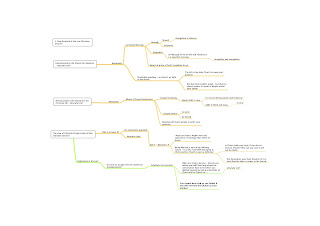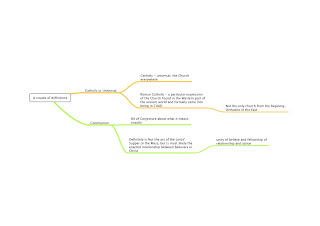Luke Talk 5 - 2:1-20
15 years ago
'I'm also rather tired of evangelicals attacking the doctrine of biblical inerrancy. Like most who have thought about these things, I certainly recognise the difficulties with the term 'inerrancy'. I also understand and deplore the abuse of it in certain circles, particularly in the service of ecclesiastical politics. I'm prepared to admit that I am less than satisfied with some of the standard expositions of this concept and would like to see it presented with more rigour and careful nuance. But I remain committed to biblical inerrancy. The Bible is not only effective as an instrument in God's hand to accomplish his purposes, it speaks of things as they really are. For all the literary variety and the rich textures which stem from different authors in different situations and with different goals, it is still possible to speak of the Bible's own investment in the question of truth and truth understood in terms of a correspondence with reality. 'Utterly truthful' and 'absolutely reliable' might be better expressions because they are at least positive rather than negative and put the accent on biblical priorities. Yet the term 'inerrancy' is an ancient one, long predating the advent of modernism and even the Reformation. Too much is lost when it is denied or excluded.
It is been said that evangelical theology has always been under attack at two points above all others — the doctrine of Scripture and the doctrine of the atonement. This has proven to be the case throughout the twentieth century and continues to be so in the twenty-first. It is tragic that these attacks have increasingly been mounted from within the evangelical constituency.'
What utter arrogance and discrimination. What gives these people the right to hoist their beliefs above everyone else's by making absolute statements about how the universe is constructed. Ignoring the fact they have no evidence whatsoever for their fairy tale beliefs, they are by default saying that everyone else's are wrong.
I have no objection to them holding these beliefs, but they should keep them to themselves and away from impressionable youth and the emtionally and mentally vulnerable.
Oh wait, that's exactly who they want to target.
ozathiest | Sydney - September 10, 2009, 8:20AM
"If you had said years ago that we would see many more people living together before marriage and double the number of kids being born out of wedlock, moralists would have seen it as proof of the decline of civilisation and the collapse of our moral fibre. But the reality is that the taboos we once thought immovable are completely flexible."
Salt believes such shifts show our maturity. "People are less preoccupied with sexuality and more concerned about discrimination, with sexism and racism and even with sustainability. Who cares if you're gay? Who cares if you live together without getting married?"
Likewise, the significance of marriage has diminished.
"People care less about the actual marriage, so they don't mind having kids outside of it."
The three annual surveillance reports, to be presented at the Australasian HIV/AIDS Conference in Brisbane today, show that indigenous people, intravenous drug users and men who have sex with men are increasingly affected by HIV/AIDS, infectious syphilis and viral hepatitis.
Unprotected sex is also linked to an increased risk of cervical, oral and anal cancer and the risk rises with increasing numbers of sexual partners.
A 2007 study published in the New England Journal of Medicine found that people who have had more than five oral-sex partners in their lifetime are 250 per cent more likely to have throat cancer than those who do not have oral sex.
The ready availability of pornography and representations of teen and adult sexuality in advertising and popular culture could negatively influence the way children and teenagers view sex, she said.
''Young people who are not informed or ready for sex education are being inundated with messages encouraging sexual behaviour that they are not ready to process and do not understand the consequences of.''






